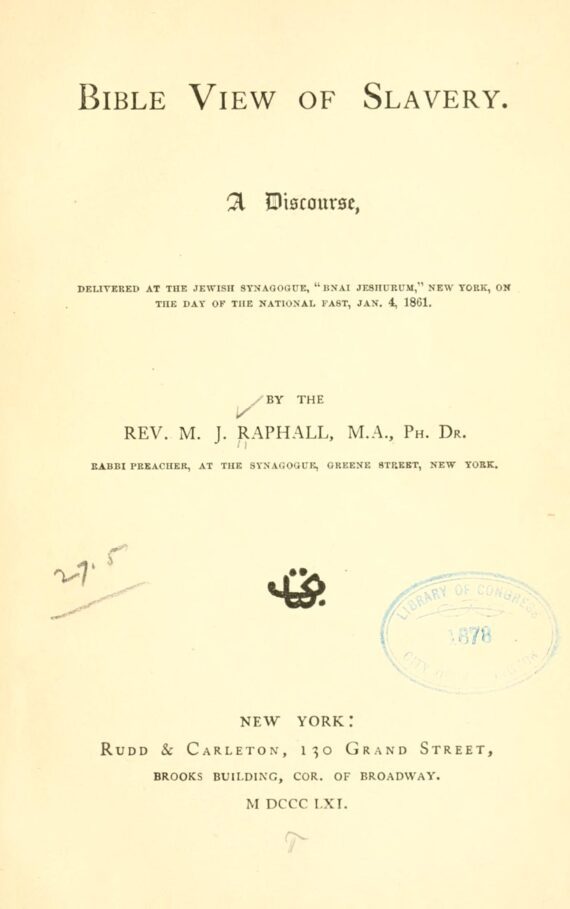
Jan. 4, 1861: Politics and Controversy
Fast Facts
-
In 1861, BJ’s Rabbi Raphall delivered a sermon in which he argued that the Bible allowed slavery; the talk was denounced as an endorsement of slavery.
-
Despite his views on slavery, the rabbi supported the Union and his son joined the Union army.
In general, Rabbi Rev. Dr. Morris J. Raphall seemed to enjoy the full confidence and affection of B’nai Jeshurun’s Board of Trustees and the congregants. There were, however, two instances that tested that support. The first: In November 1860, Rabbi Raphall was censured by the synagogue’s Board of Trustees for signing a letter which favored the election of a specific judge. The Board of Trustees wrote:
“We … respectfully suggest to Dr. Raphall the impropriety of any intermeddling with politics as we firmly believe such a course to be entirely inconsistent with the Jewish clerical character, calculated to be of serious injury to the Jews in general, and to our Congregation in particular.”
A second, more infamous incident occurred on Friday, January 4, 1861. The day had been proclaimed by then-President Buchanan as a national day of “humiliation, fasting, and prayer” for the preservation of the Union. Congregation B’nai Jeshurun observed the fast day, and that night Rabbi Raphall delivered a lengthy sermon in which he argued that slavery had existed since earliest times, as “an integral part of the social structure,” and can be supported by many textual interpretations. The teaching brought him a “storm of notoriety for its endorsement of slavery.” When two weeks later, he delivered a talk at the New York Historical Society, it was described in an article in the New York Tribune on January 18, 1861:
“The room … was about two-thirds filled last evening with an audience curious to hear a Pro-Slavery Jewish Rabbi expound to them the principles of Christianity, and attempt to prove from the Sacred Word that the Savior sanctioned Slavery… Dr. Raphall is a stoutly built, almost portly man, with a round face and white whisker. He looked through very large glasses, and wore the close cap peculiar to his persuasion… He asserts that the Bible places slavery ‘under the same protection as any other species of lawful property’.”
The text of the sermon was published in several newspapers. Other leading rabbis, such as Rabbi David Einhorn, wrote extensive rebuttals and argued that the slavery practiced in the American South was cruel and at odds with Jewish morality.

Despite the rabbi’s view of slavery, he had a son who joined the Union Army, as did others in the congregation. After the Civil War formally began in April 1861, the Union flag was displayed from the top of the synagogue building. In 1862, funds were solicited for the establishment of Jewish Chaplains in the camps of the army of the Potomac as well as for aid of the sick and wounded soldiers in the Jewish Hospital. Upon news of President Lincoln’s assassination, the synagogue was draped for mourning and a delegation, including Rabbi Raphall, proceeded to Union Square to participate in a citizen’s demonstration on April 25, 1865.
Source
Israel Goldstein, A Century of Judaism in New York: B’nai Jeshurun 1825–1925
BJ: The First 100 Years: 1825–1925
This essay was first published in an exhibition as part of BJ’s bicentennial celebrations.
Discover moments that defined BJ’s initial century: political protests, educational innovations, impassioned membership debates, and architectural milestones.

